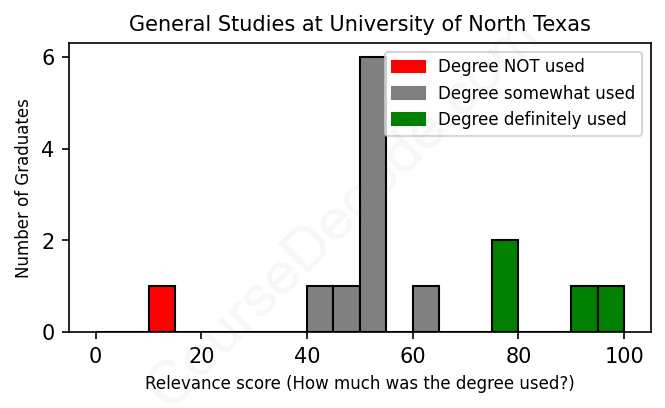
First, some facts. Of the General Studies graduates from University of North Texas we've analyzed , here's how many have used (or NOT used) their degree in their career:

These are estimates based on AI analysis of 14 LinkedIn profiles (see below).
The verdict? Below average. Overall, with an average relevance score of 58%, General Studies graduates from University of North Texas have a lower likelihood (-9%) of finding work in this field compared to the average graduate across all fields:
And for comparison, here's the chart for all profiles we've looked at across all degrees.
Also, after graduating, only 14% of these graduates have pursued further education other than another Bachelor's degree (such as a Masters degree or other), compared to the average across all profiles of 35%. This suggests a Bachelors degree is enough for most General Studies graduates, and it's normal to look for work straight after graduation.
See the details:
|
Relevance score: 50% We think this person has gone into a career only somewhat relevant to their degree. We think this person has gone into a career only somewhat relevant to their degree.
DEGREE INFOGraduated in 2012 from University of North Texas with a Bachelor's Degree in General Studies. No other secondary education since. JOB HISTORY SINCE GRADUATIONOfficer USAF 2012 - Present ABOUTNo information provided. |
The top 10 most common jobs done by the graduates we've analyzed (ranked most common to least) are:
When looking at the career paths of folks who studied General Studies at the University of North Texas, a mixed bag of job titles pops up. Many of the jobs seem to lean towards administrative roles, customer service positions, or even management in various sectors, like real estate and the restaurant industry. There’s a sprinkle of teaching and educational support roles, mainly because those jobs often require communication and interpersonal skills that General Studies programs emphasize. However, it’s kind of clear that most of these jobs don’t directly call upon core knowledge from a General Studies degree, focusing more on broad skills like organization, people skills, and problem-solving rather than any specific content from their studies.
Overall, while there are some relevant roles, particularly in education, many graduates find themselves in positions that might use some skills they've gained, like communication or management, but not much more than that. The degree itself seems to serve as a decent springboard—helping them develop essential soft skills—but it doesn’t always translate to specific job functions. So, if you're thinking about pursuing a General Studies degree, it can open doors but be aware those doors might lead you to various paths that don’t directly link back to your coursework!
Here is a visual representation of the most common words in job titles for General Studies graduates (this is across all General Studies graduates we've analyzed, not just those who went to University of North Texas):

When it comes to graduates from the University of North Texas with a degree in General Studies, their career trajectories reveal a mix of paths. Many seem to land jobs relatively soon after graduation, often starting in administrative roles or customer service positions. For instance, a lot of them began their careers as administrative assistants, office managers, or in recruitment roles, showing that they utilized their broad skill set in practical ways. This trend is indicative of the versatility of a General Studies degree, allowing students to adapt to various entry-level positions across different industries right after graduation.
Looking further down the line—about five to ten years after graduation—the picture becomes a bit more varied. Some graduates have progressed into specialized fields like real estate, teaching, or even higher administrative roles. Others have taken more unconventional paths, such as becoming artists or connecting their studies to government positions. On the flip side, there are also graduates who seem to have plateaued or found themselves in roles that don’t fully leverage their degree, working in fields like customer service or administrative support long term. Overall, while there are some great success stories, it appears that not every graduate is translating their General Studies degree into a relevant and fulfilling career, making it a mixed bag of outcomes.
Honestly, a Bachelor’s degree in General Studies can be pretty manageable, especially at a school like the University of North Texas. It’s designed to give you a broad range of knowledge across different fields without going super in-depth into any one area. If you’re someone who enjoys learning a little bit about lots of topics and you can stay organized, you’ll likely find it easier than more specialized degrees. However, keep in mind that while it might not be the toughest path, you'll still need to put in the effort to keep up with the coursework and meet your assignments. So, if you're looking for something that’s generally on the easier side but still offers you a solid education, General Studies could be a good fit!
Most commonly, in the LinkedIn profiles we've looked at, it takes people 3 years to finish a Bachelor degree in General Studies.
So, looking at the job paths of these General Studies graduates from the University of North Texas, it seems like they've landed a pretty decent range of positions, but their paychecks probably vary quite a bit. For instance, those who moved into fields like real estate or legal services, like the Realtor or Attorney, are likely raking in some solid cash, especially compared to others in education or administrative roles where pay tends to be on the lower side. Overall, it feels like they're doing okay, but it really depends on the specific job and industry they hopped into after college. So, while some might be making bank, others are probably just getting by.
Here is a visual representation of the most common words seen in the "about" section of LinkedIn profiles who have a Bachelor degree in General Studies (this is across all General Studies graduates we've analyzed, not just those who went to University of North Texas). This may or may not be useful:

Here are all colleges offering a Bachelor degree in General Studies (ordered by the average relevance score of their General Studies graduates, best to worst) where we have analyzed at least 10 of their graduates:
| College | Score | Count |
|---|---|---|
 Southeastern Louisiana University Southeastern Louisiana University
|
69 | 10 |
 University of Louisiana at Lafayette University of Louisiana at Lafayette
|
62 | 16 |
 Western Illinois University Western Illinois University
|
59 | 10 |
 Eastern Illinois University Eastern Illinois University
|
59 | 12 |
 University of North Texas University of North Texas
|
58 | 14 |
 Eastern Kentucky University Eastern Kentucky University
|
57 | 13 |
 University of Central Oklahoma University of Central Oklahoma
|
55 | 15 |
 Texas Woman's University Texas Woman's University
|
53 | 10 |
 Southern New Hampshire University Southern New Hampshire University
|
52 | 17 |
 Columbia College Columbia College
|
45 | 18 |
 Ball State University Ball State University
|
34 | 11 |